- Home
- William Kennedy
Quinn's Book
Quinn's Book Read online
Praise for William Kennedy:
“Kennedy is a writer with something to say, about matters that touch us all, and he says it with uncommon artistry”
Washington Post
“Kennedy’s power is such that the reader will follow him almost anywhere, to the edge of tragedy and back again to redemption”
Wall Street Journal
“Kennedy’s art is an eccentric triumph, a quirky, risk-taking imagination at play upon the solid paving stones, the breweries, the politicos and pool sharks of an all-too-actual city”
The New York Review of Books
“His smart, sassy dialogue conveys volumes about character. His scene setting makes the city throb with life”
Newsday
“What James Joyce did for Dublin and Saul Bellow did for Chicago, William Kennedy has done for Albany, New York: created a rich and vivid world invisible to the ordinary eye”
Vanity Fair
“His beguiling yarns are the kind of family myths embellished and retold across a kitchen table late at night, whiskified, raunchy, darkly funny”
Time
“William Kennedy’s Albany Cycle is one of the great achievements of modern American writing”
Daily Mail
“William Kennedy is pre-eminent among his generation of writers . . . Kennedy is peerless in the depth and acuity of his sustained vision, and the lost, past world of Albany says more to us today about the current state, about the heart and soul, of American politics than any recent bestselling, Hollywood-pandering political thriller has ever done”
Spectator
“Kennedy’s writing is a triumph: he tackles topics in a gloriously comic, almost old-fashioned language. You feel Kennedy could write the Albany phone book and make it utterly entertaining”
Time Out
“Kennedy proves to be truly Shakespearean”
The Sunday Times
“Kennedy is one of our necessary writers”
GQ
ALSO BY WILLIAM KENNEDY
FICTION
The Ink Truck
Legs
Billy Phelan’s Greatest Game
Ironweed
Very Old Bones
The Flaming Corsage
Roscoe
Changó’s Beads and Two-Tone Shoes
NONFICTION
O Albany!
Riding the Yellow Trolley Car
WITH BRENDAN KENNEDY
Charlie Malarkey and the Belly-Button Machine
Charley Malarkey and the Singing Moose
First published in the USA by Coward, McCann & Geoghegan Inc. 1975
This ebook edition published by Simon & Schuster UK Ltd, 2011
A CBS COMPANY
Copyright © William Kennedy, 1975
This book is copyright under the Berne Convention.
No reproduction without permission.
All rights reserved.
The right of William Kennedy to be identified as author of this work has been asserted in accordance with sections 77 and 78 of the Copyright, Designs and Patents Act, 1988.
Simon & Schuster UK Ltd
1st Floor
222 Gray’s Inn Road
London WC1X 8HB
www.simonandschuster.co.uk
Simon & Schuster Australia Sydney
Simon & Schuster India Delhi
A CIP catalogue record for this book is available from the British Library
ISBN: 978-1-84983-848-1
eBook ISBN: 978-1-84983-849-8
This book is a work of fiction. Names, characters, places and incidents are either a product of the author’s imagination or are used fictitiously. Any resemblance to actual people living or dead, events or locales is entirely coincidental.
All reasonable effort had been made to contact the copyright holders of text used in this book. Any copyright holders not contacted should write to Simon & Schuster UK.
Typeset by Hewer Text UK Ltd
Printed and bound by CPI Group (UK) Ltd, Croydon CRo 4YY
The author would like to acknowledge with gratitude
the support of the MacArthur Foundation
during the years that this book
was being written.
This book is for
Dana,
By Herself
Contents
BOOK ONE
A Cataclysm of Love Albany, Winter & Spring 1849–1850
The Dumb Cake Saratoga, Spring 1850
BOOK TWO
A Bazaar of Enticement Albany, Summer 1864
Tambo & Paddy Go to Town Saratoga, August 1864
. . . a man’s work is nothing but this slow trek to rediscover, through the detours of art, those two or three great and simple images in whose presence his heart first opened.
— ALBERT CAMUS
I, DANIEL QUINN, neither the first nor the last of a line of such Quinns, set eyes on Maud the wondrous on a late December day in 1849 on the banks of the river of aristocrats and paupers, just as the great courtesan, Magdalena Colón, also known as La Última, a woman whose presence turned men into spittling, masturbating pigs, boarded a skiff to carry her across the river’s icy water from Albany to Greenbush, her first stop en route to the city of Troy, a community of iron, where later that evening she was scheduled to enact, yet again, her role as the lascivious Lais, that fabled prostitute who spurned Demosthenes’ gold and yielded without fee to Diogenes, the virtuous, impecunious tubdweller.
This crossing was vexatious to all logic, for earlier in the day, before the wildness came, she might have crossed far more safely farther north via the dependable, strong-hulled ferry that would have carried her over a narrower and calmer band of the Hudson without incident and deposited her upon the steps of the Troy wharf. But recklessness was far likelier to send the shiver of lust through the spines of men, fire envy in the livers of their wives and daughters, and set tongues to gossipaceous clacking that would pack the hall for La Última’s next performance; and so she had advertised in the Albany Chronicle that she would pay one hundred dollars, a bloody fortune, to any boatman who would, at four in the afternoon, take her, her luggage, her serving maid, and the child who traveled with her across the river from Albany to Greenbush, where she would board a carriage bound overland to Troy.
Her advertisement appeared at the end of a week’s spell of unseasonably balmy weather. She’d been in Albany five days, enthralling theatergoers with her acting and dancing, her beauty and sensual aggression. (Indeed there were some in the city who blamed her not only for the warm spell but even for the evil and grief that would befall us all on the day of her leave-taking.) The balminess had brought on the partial melting of the river’s heavy ice, and had also halted all crossings by sleigh. A sizable channel opened in the river’s center and a few sloops went straightaway downriver with little trouble. But cutting crosswise into that current and its ice floes with a skiff was another matter.
The skiffmen had come out in number at the hour specified in La Última’s advertisement and clustered under the Great Albany Pier with their craft, at rest on the shoreline’s ice. But as the warmth of the day deepened, those wary Albany water rats (I include my master) were in agreement that the floes’ growth in size and frequency, indeed the whole river’s present nature, which was one of mild flood, argued that skiffs had no function on water such as this; all agreed, I say, except Carrick, the rotten Scottish hunchback of syphilitic mien, no longer welcome in the brothels of Albany, who had reached no such decision and was firm in his life’s role as Albany’s undauntable ferryman, ready to carry the urgent mail, the woeful news, or the intrepid passenger across the waters during storm or flood, and now the only soul at the pier willing to transport this plumed cargo to the far shore.
La Última’s crossing had attracted such crowds that the bridge from the Quay Street shore out to the Great Pier (which paralleled the quay thirty yards from the shore) creaked with the weight of hundreds as La Última, her maid, and the child arrived in their carriage. A dozen men on the quay shoved aside the mob of ill-clad urchins who were vying for the right to carry La Última’s trunk and to escort, hand-by-glove, the grand señora (for she had lived through three legitimate husbands, plus several hundred lovers). As she dismounted from the carriage she took command of the raffish disorder, singled out two muscular men, and gave them five dollars each (thus ensuring the security of two families, or at least the slaking of two thirsts, for the ensuing fortnight) to carry her trunk and hand luggage. She strode ahead of her entourage straight into the crowd, which parted at her advent to allow her entry to the steps leading down to the boats. There, standing on the ice in front of his skiff, Carrick greeted her, scraping obsequiously and explaining that only he was willing to cross these waters with her valuable self, prompting La Última to sniff in the direction of the other boatmen and give us all the flick of her chin in contempt for our lack of courage.
“It eees a pleasure to meet a rrreal mon,” she said in her fraudulent, Hispanicized English (she was of Hibernian stock and spoke the language perfectly). She lifted Carrick’s woolen hat and kissed him on his lumpy forehead as she might a pet piglet, then handed him, most ostentatiously, the promised one-hundred-dollar bill. The crowd cheered the hunchback, who flashed his toothless smile, pocketed the bill, and then gave La Última his hand to help her into his craft. The child and the maid followed (the maid in height, facial contours, and hair color being very close to a duplicate of the actress, it being commonly known that for special suitors the women dressed like twins). Carrick and his helper then lifted the skiff’s line from its mooring post and pushed off from the shoreline’s ice out onto the water. The boatmen stood up in the skiff and poled like gondoliers past the end of the Great Pier, Carrick poking the water ahead of the bow, seeking the floes, guiding them out of the way with the poling oar. And thus did the crossing begin and the skiff move out into open water on this dusky afternoon of high tragedy.
The skiff had reached the center of the river when we saw it wedge into a floe that would not yield to the prickings of the poles, saw it go crooked in the current and move slowly downriver backward, out of the hunchback’s control. I could see La Última tightly gripping the side of the skiff with one hand, holding her hat with the other. The great, unseasonal feathered and amber plume in that hat, a match to her amber coat with the beaver collar, is as indelible in my memory as is the vision of her maid holding tightly to the child, and of Carrick and his helper poking the ice with their long sticks, a pair of needles attacking an iceberg, as the boat floundered like a toy.
My master and another boatman, named Duff, immediately shoved off into the water—I was sitting in our craft but not consulted—and we headed out for the rescue, proving, I thought, that virtue needs only a challenge to be awakened from dormancy. But my master was moved for quite another reason, and we were halfway to the trapped boat because of that reason when we saw a large hillock of ice smash into Carrick’s craft and stove in its side, causing it to instantly list and take in water. We reached it too late to save Carrick, his helper, or the maid, who were knocked out of the boat when the hillock struck. It was I, however, who reached the child about to go under and hoisted her into our own skiff, while Duff behind me held off the flowing ice to guard my flank in the racy waters. And then my master, John the Brawn, caught the beaver collar of La Última’s coat with his boat hook, and with one mighty lift, hauled her and her sodden plume up from the current, alas beyond our help.
“One dead slut,” said my master as he also hooked La Última’s floating trunk and lifted that aboard, too, that being the true focus of his concern. The child’s countenance was as frigid in the face of death, loss, fright, and strangers as were the river’s wicked waters, which were just beginning their avaricious devouring of human life. Not until springtime would the maid and Carrick turn up, sixty miles downriver, locked in grotesque, inverted embrace on the eastern shore (Carrick’s pockets turned out), as if they had been out for an orgiastic swim and had died submerged in perversion.
We made our way back to the pier, I full of such fears as might have paralyzed me had I not been in thrall to the vivid young girl who held my hand with the same tenacity a starving wolf might grip with peerless jaws the flank of a vagrant deer. In truth, her grip was more memorable by double than the frigid bite of the river, which would leave me forever with fingers that only the summer sun could ever truly warm.
The crowd had grown ever larger on the bridge as word spread of our rescue effort, and as we moved onto the shore ice with our boat and our salvage, those crescive masses began struggling for greater vantage, shoving rudely among themselves, when suddenly, with a flagitious roar and an agonized whine, the old wooden span collapsed in twain, plunging a hundred or more of our citizens onto and through the fragile ice and into the deadly bath, while another hundred saved themselves with desperation leaps and wild clutchings to the fractured boards and railings; and there ensued then a mad scrambling upward and sideward by that doomed and threatened clot.
Their shrieks were the saddest sounds of my young days and instantly we all moved in our boats to help those we could. We saved about forty and lost we’ll never know how many in those first few minutes before the onset of the even greater cataclysm, which, when we perceived it (I say we by way of collecting the common perspective we arrived at in a later and calmer moment), generated in us such fear of the Lord, of nature gone wild, of cosmic, mythic rage against our vulnerable puniness that we were negated as individuals and became as grains of sand, as desiccated leaves. We survived only because we survived. There is no other ascribable reason or logic behind who was saved and who wasn’t, any more than there was logic in the way I alone of my family had come through the cholera unscathed.
The torrent came while we were frantically rescuing the drowning hordes from the bridge, roared down upon us from the northern river—a rush of ice like none in Albany had ever seen, even the eldest. It came, they later said, from the Mohawk River, careening with tumbling, tumultuous dudgeon into the Hudson, dislodging more and more of both rivers’ heat-weakened blankets of ice, crunching and cracking and pushing more and more of its own fractured surface until, reaching Albany, the glut bedammed itself, clotted the whole transverse of the river’s channel with chunks and prisms of ice in a sudden upthrust, a jagged wall built so quickly and with such superb natural engineering that had we not been hauling in the wet and the dead we would have given it the same attention we give an eclipse of the sun, for it was equivalently awesome.
The wall of ice grew from a relatively small, fencelike structure, say five feet high, across the thawed center of the river, continued building upon that fence a pyramid, a mountain, an instant Albany iceberg that never was before and probably never will be again. It rose to what some calculated as the height of ten men. Others said twenty. It grew swiftly upward with boundless force, brilliant chaos, and just as we thought it would never cease to grow, it was struck from within and below by some central power we could neither see nor understand, even now, but which exploded that mountain into a Vesuvius of crystal, showering the shores of both Albany and Greenbush with fragments, wounding an unsuspecting half-dozen people, killing two horses and a pregnant cat on the quay, and loosing a tidal wave that swept every object storehoused on the Great Pier, including barrels of coffee, piles of lumber and staves, and another dozen men, tumbling them into the torrent as if they were the river’s own algae, which they would very soon become.
That wave would raise us all, the drowning masses, the handful of salvationists, to its stunning crest, then settle us back into a trough, rocking us on a slowly rising flood tide that would, half an hour after our departure, spill over the quay and crawl into storehouses, and, worse, into the
plaster works and lime kiln, there mixing with and slacking the lime into chemical combustion that would set fire to a block of stores along the quay frontage: fire rising out of flood—the gods gone mad.
Because there was such panic, such fear, I focused finally on what was possible for us alone to do: save the child, this orphan of the river, who was shivering and unable to walk when I lifted her out of our skiff onto the shore and led her up the steps to dry ground, knowing, as we threaded our way through clusters of desperation, that this frail creature would die of frozen blood if I did not soon warm her. My master, meanwhile, lifted the corpse of La Última from the skiff and plopped it down on the shore ice, far more concerned with the contents of her trunk than with the disposition of her person. Even as the child and I were saving ourselves from water, John the Brawn, under the eyes of heaven and all the bereft, was hammering at the latch of the trunk with the end of his oar: a vision of how the fear of death easily yields to the power of greed. But the trunk would not yield, and so John turned again to the dead Magdalena Colón, clutched her under his left arm, and, gripping the trunk handle with his right hand, ascended the quay’s steps, bumping both the actress’s toes and trunk on every step as he came, but rising willfully up from the water to dry turf, a Palaemonic figure bereft of sanity.
On the quay the kin and kith of the lost were loud in their lamentations, while at least twoscore people were still clinging to the far segment of the fractured bridge, some of them failing of purchase and falling through the broken ice, either emerging by splash of will and main strength or vanishing in frozen weakness beneath the rising tide of ice and blood.
John stood the trunk on its end and gave both his hands to the dead Magdalena, lifting her into a semblance of womanly order, however dead, and laying her down again so as to catch his breath and consider the immediate future. He turned his gaze to the child we would soon know to be Maud, and he asked her, “Have ye family?” Maud only stared at him as an answer, and then he cast an eye at Magdalena.

 Riding the Yellow Trolley Car: Selected Nonfiction
Riding the Yellow Trolley Car: Selected Nonfiction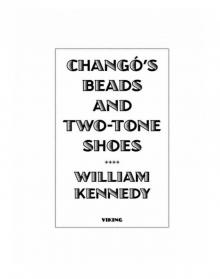 Changó's Beads and Two-Tone Shoes
Changó's Beads and Two-Tone Shoes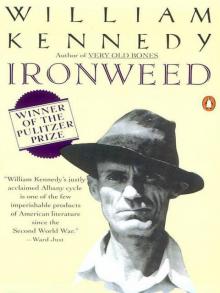 Ironweed
Ironweed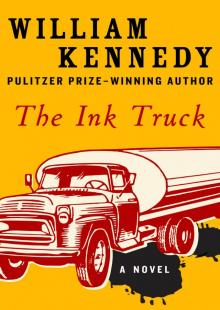 The Ink Truck
The Ink Truck Billy Phelan's Greatest Game
Billy Phelan's Greatest Game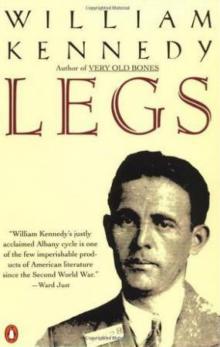 Legs
Legs Very Old Bones
Very Old Bones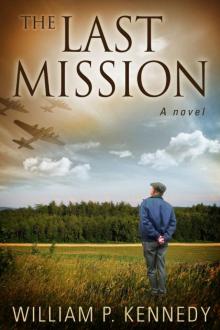 The Last Mission
The Last Mission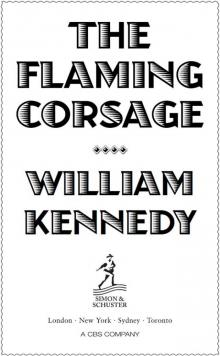 The Flaming Corsage
The Flaming Corsage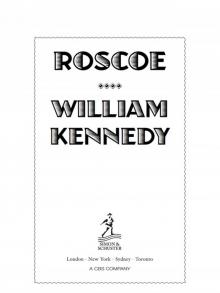 Roscoe
Roscoe Quinn's Book
Quinn's Book Ironweed (1984 Pulitzer Prize)
Ironweed (1984 Pulitzer Prize) Riding the Yellow Trolley Car
Riding the Yellow Trolley Car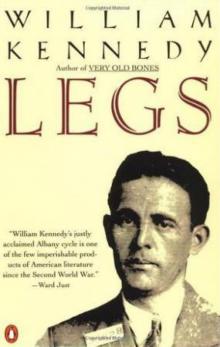 Legs - William Kennedy
Legs - William Kennedy